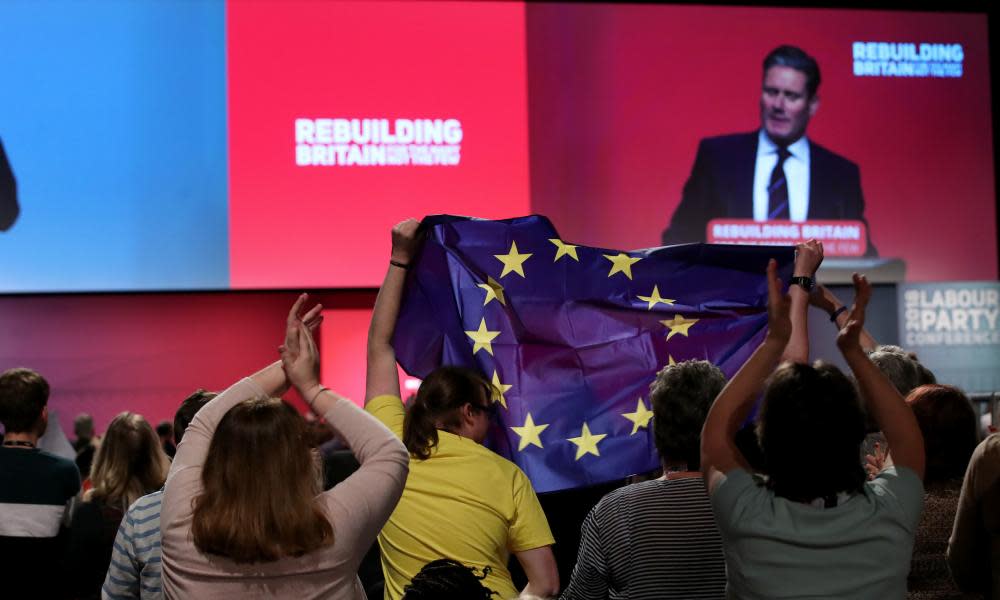Labour's Brexit plan: to have an illusion of a plan, not an actual plan

Confused? You soon will be. After an hour in which delegates argued about constitutional arrangements and conference procedures which only they appeared to fully understand, Keir Starmer was finally called to the lectern to begin the Brexit debate. It was a question of priorities. First things first.
“Just when we need a strong government, what do we see?” he began. “Division. Chaos.” You had to admire his honesty. Trying to keep up with Labour’s internal manoeuvrings on its Brexit proposals over the previous 24 hours had proved to be next to impossible.
Despite having come up with a composite motion that was sufficiently vaguely worded to mean whatever anyone wanted it to mean, the shadow chancellor, John McDonnell, had already managed to disagree with himself in two separate interviews on just what a people’s vote would signify.
At this rate, Labour will soon need to give hourly updates on its latest policy positions. Assuming anyone knows.
Having apologised for his own party’s failings, the shadow Brexit secretary turned his attention to the Tories. They were at war over Chequers, had no credible plan and Labour would vote down any deal that involved a bad, vague or blind Brexit. So far, so on message. Nothing that anyone didn’t already know – even Barry Gardiner, never the sharpest member of the shadow cabinet, who, at a fringe event, hadn’t appeared to know Labour was meant to be talking up the possibility of a general election. Though it was just possible he was ahead of the policy curve rather than behind it.
As he neared the end of his speech Starmer glanced to his left and noticed that Jeremy Corbyn wasn’t in the hall. Out of sight, out of mind, so he decided to veer off from his agreed text and ad lib. When it came to a people’s vote, no one would be ruling out remain as an option. There were a few astonished gasps and then at least half of a near full auditorium rose to give him a standing ovation. This is what they had come to conference for. To be offered some hope on Brexit. And their faith had been rewarded.
Starmer appeared genuinely surprised by the reaction. His delivery has always tended towards the forensic rather than the motivational, and his speeches are normally rewarded with polite rather than appreciative applause. He blushed a little and let the love wash over him. He could get used to this. Labour policy had been rewritten yet again, live in the conference hall.
Not everyone was quite so delighted though. The Labour MP Dennis Skinner and several hundred others remained motionless in their seats, their faces locked in a furious rictus disbelief. This wasn’t just a betrayal of a vital Labour party principle that anything contentious be debated in private, it was a betrayal of all Labour supporters who had voted leave in the referendum campaign. The result was sacrosanct and it was just too bad if things didn’t turn out to be quite so rosy as had been promised.
With just 90 minutes allocated to Brexit – it wasn’t as if it was a matter of national existential crisis – several delegates chose to use their turn on the platform as group therapy.
Tim Roache, of the GMB union, vented his hatred of Blairites – always good to keep the real enemy in your sights – while Aslef’s Tosh McDonald rolled back the years to share three decades of unresolved pain. He had hated Margaret Thatcher so much, he confessed, that he used to set his alarm clock an hour early so he could get an extra 60 minutes of hate into his day. The crowd let out a primal scream of recognition.
It took Unite’s Steve Turner to refocus the conference on Brexit. Starmer had been out of order, he said. And would be taken out and shot in the dog exercise area within the hour. If there was a people’s vote – not that there would be if he had anything to do with it – the simple choice would be giving everyone the chance to decide on whether they wanted to have two arms sawn off or just the one. It was unthinkable that anyone might be given the option of keeping both arms. That would be against the will of the people. And against the will of the Labour party, whose newly revised official Brexit policy was to have an illusion of a plan rather than an actual plan.
Brexit had been reduced to a game of cards that neither the Tories nor Labour actually knew how to win. Leaving both sides circling one another, hoping the other blinked first and made the fatal mistake. This could get bloody.

 Yahoo News
Yahoo News 
